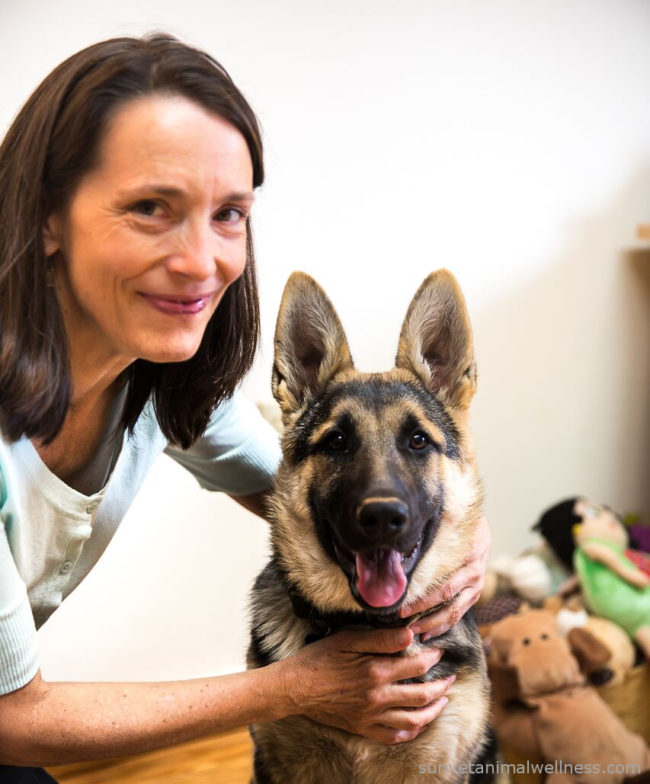Integrative vet Dr. Laurel Davis offers the blog of a holistic vet and “animal interpreter,” called Stories from a Holistic Vet. With a clinic in downtown Asheville, NC. Dr. Laurel also offers animal health, lifestyle and vaccination advice for dogs and cats and their human friends across the country.
Have a question for Dr. Laurel? Send it in.
Want comprehensive or detailed dog or cat advice? Schedule an Ask Dr. Laurel™ phone or Skype consultation.
Reader Question: Can Vegan Dogs and Cats be Healthy?
Part 1: Vegan Dogs

We love our Sunvet Animal Wellness Clinic Facebook followers! We get so much thoughtful feedback and great queries from our community there. When Molly asked: “Curious… what is your opinion on vegan diets for our fur babies?” I couldn’t resist replying in full. This is a brilliant topic for the numerous people deciding to embrace ways of living that are gentler on the planet and themselves.
Vegans and strict vegetarians consume only plant-based foods. They don’t use or consume any animals or animal products including; flesh (land or sea animals), milk, eggs, or honey. Almost exclusively, the folks that are interested in feeding their animals a vegan diet are vegan themselves. The part of me that understands their decision realizes they make their dietary choice because they cherish all living beings. They believe in not killing any sentient animals, therefore they make the decision to opt out of any animal-based food for their four-legged furry companions in order to bring the diet of their whole household in line with their values.
The essential question is, “Can we truly feed dogs and cats nutritionally and energetically complete vegan diets?” The answer is… it’s complicated. We are dealing with two very different species. Canines are omnivores, meaning they eat both plants and animals, whereas cats are true carnivores. Because of these differences, I’ve decided to address our dog and cat companions separately. Today we’ll talk about vegan dogs, and in the next post in this series, we’ll look more closely at our feline friends.
Feeding Vegan Dogs:
Dogs are not the true carnivores that cats are. In fact, much of the scientific literature classifies them as omnivores. Omnivores can consume both plants and animals. As such, dogs can more easily thrive on a properly formulated vegan diet. This makes sense from a historical standpoint because canines bonded with man; another classic omnivore, over hunting strategies.
A vegan dog’s diet takes extra consideration to make sure it is balanced. Special attention must be paid to make sure vitamin A, vitamin D, taurine, and L-carnitine are included in any plant-based diets. If these are lacking, they can result in cardiomyopathy (an enlarged flabby heart) or eye and skin problems. Many vegetarians and vegans feed healthful, meatless diets to their companion animals. One remarkable example is that of Bramble, a 27-year-old border collie whose vegan diet of rice, lentils, and organic vegetables earned her recognition by the Guinness Book of World Records as the world’s oldest living dog in 2002.
I will say, some canines will readily gain unhealthy amounts of weight when fed a vegan diet, which is exclusively carbohydrate. For these pups, it may be best to include some meat protein. As with any dietary change, monitor your buddy and make changes gradually!
These four-legged beings we nest with are worthy of our every consideration. At all times, we need to consider what is in their best interests, for we have chosen to be the caretakers of these magnificent and special love muffins.
If this post sparked some curiosity and you would like to learn more about which reputable companies sell vegan dog and cat food products, we’ve put this list together just for you!
Shine on,
Dr. Laurel Davis is a holistic Asheville vet offering phone and Skype consultations for animal lovers everywhere. Call 828-254-2221 or order an Ask Dr. Laurel™ phone or Skype session or bring your dog or cat to her downtown Asheville, NC clinic. Read more patient stories.
Get to know Dr. Laurel by reading her blog.
Do you have a story about Dr. Laurel’s dog advice or how she helped your dog or cat? Please post your comment on our Facebook page or write a Google Review.


